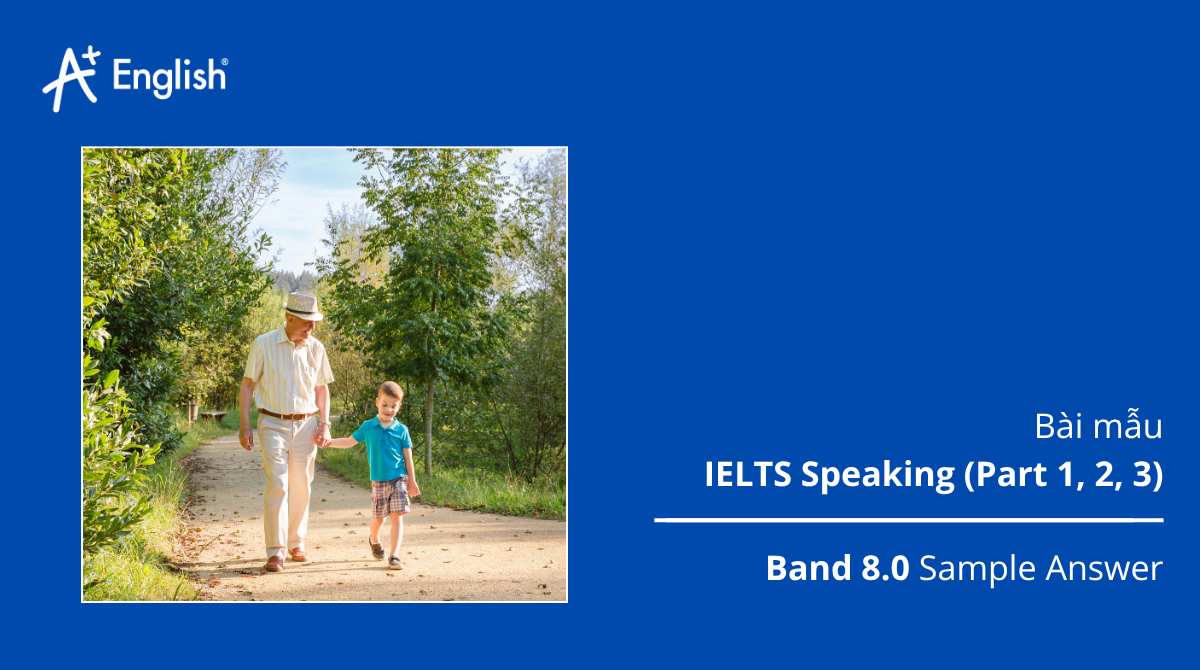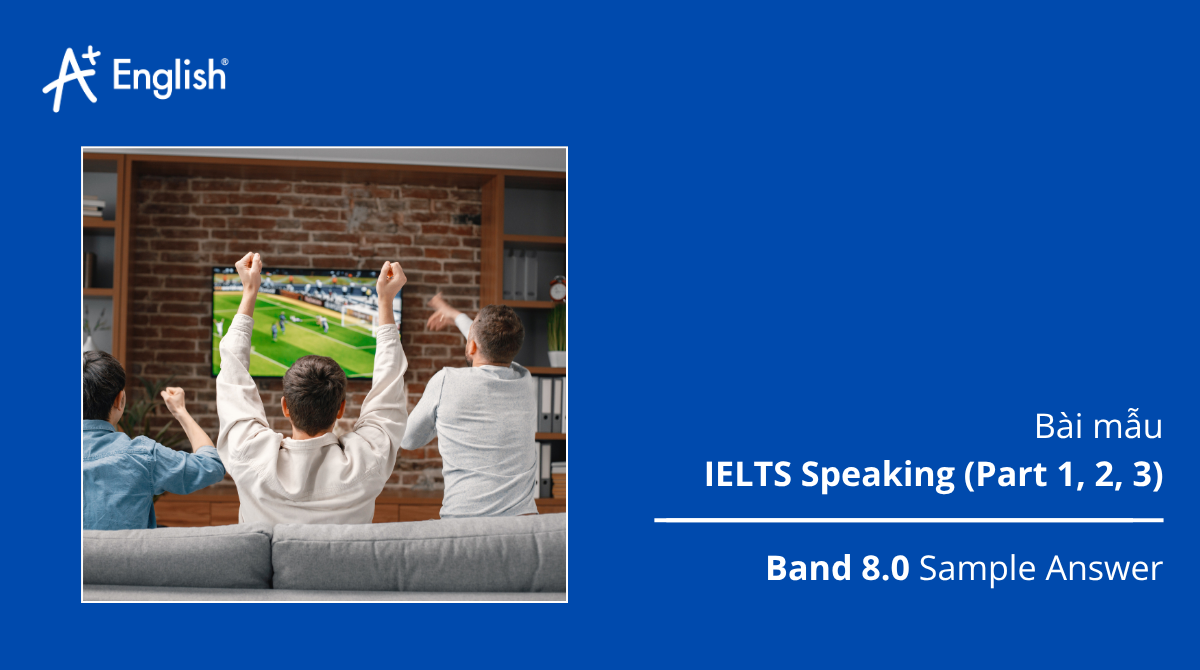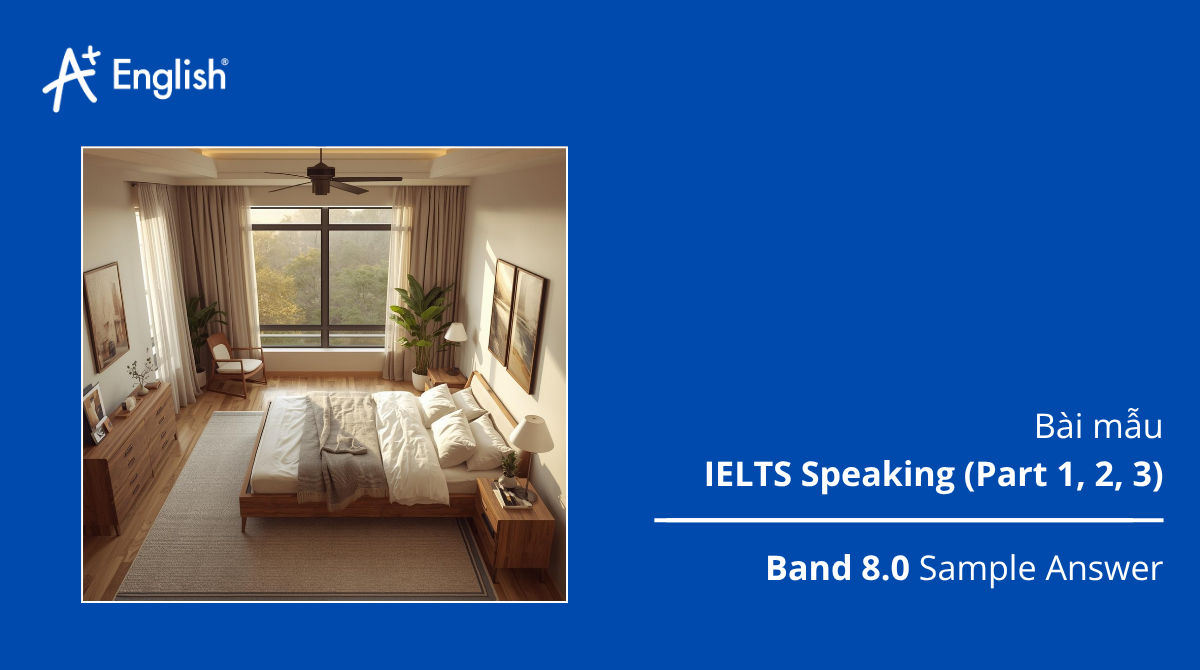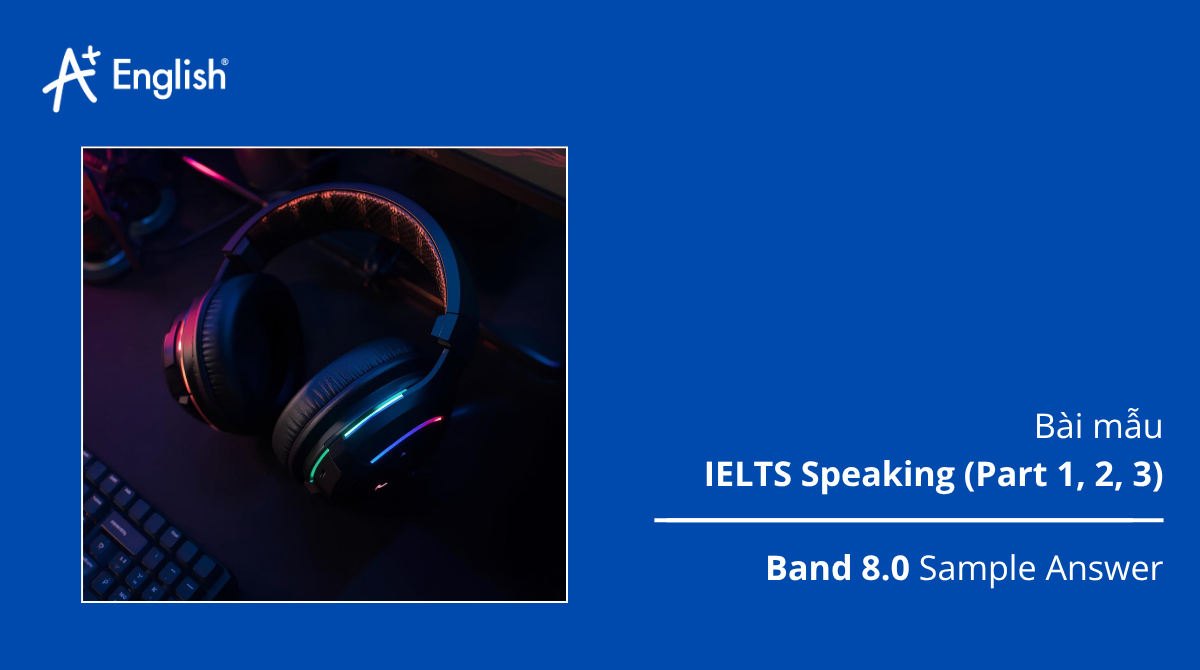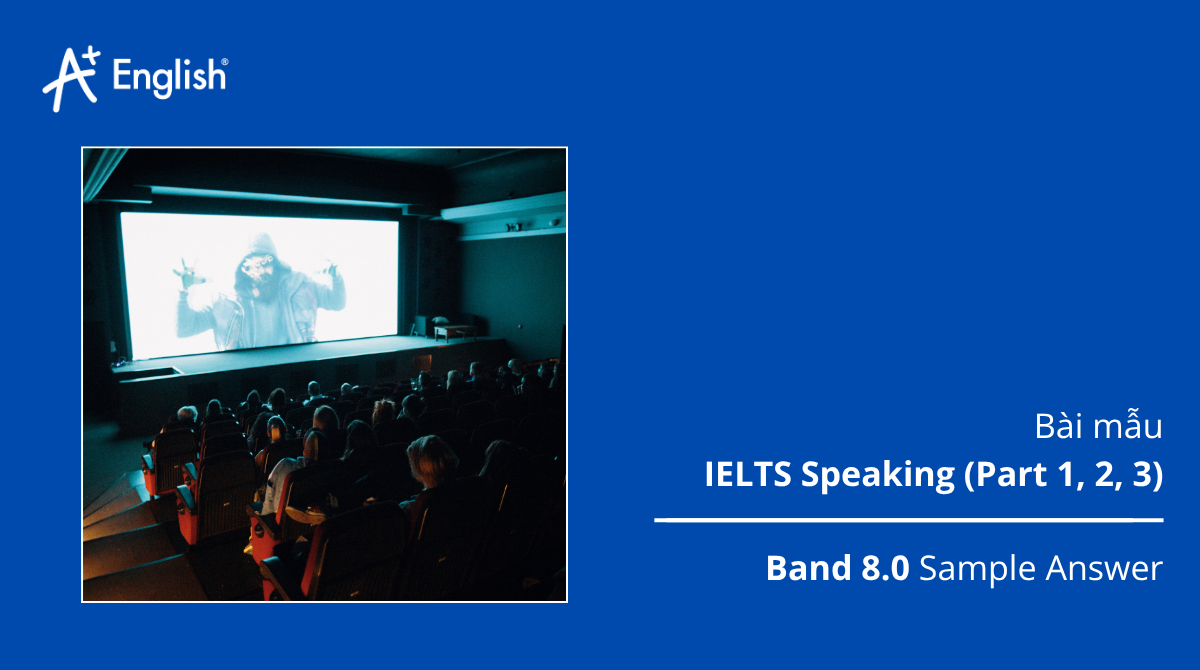A+ English xin giới thiệu đến các bạn bài mẫu IELTS Speaking band 8.0 với những câu trả lời ấn tượng và tự nhiên, giúp thí sinh ghi điểm cao trong kỳ thi.
Bài mẫu không chỉ gợi ý cách triển khai ý tưởng mạch lạc mà còn cung cấp từ vựng phong phú, cấu trúc câu đa dạng và cách diễn đạt tự nhiên, giúp bạn tự tin giao tiếp và thuyết phục giám khảo.
Hãy cùng khám phá ngay để nâng tầm kỹ năng Speaking của bạn nhé!
Nội dung chính
1. Đề bài IELTS Speaking (Assignment)
| PART 1
Now let’s talk about reading. Did your parents read to you when you were a child? Why/Why not? Do you read for pleasure very often? Why/Why not? What kind of books or magazines do you buy? Why/Why not? Which do you find easier, reading in English or writing in English? Why? |
| PART 2:
Describe an elderly person in your family who you enjoy talking to. You should say:
And explain why you enjoy talking to this person. Follow-up questions
|
| PART 3
Let’s go on to talk about elderly people who live with their families. In your country, do most grandparents live in the same house as their children and grandchildren? Why/Why not? What are the advantages and disadvantages for grandparents of living in the same house as their children and grandchildren? Now let’s talk about retirement. Do you think some people retire from their jobs too early? Why/Why not? Why do you think some people feel unhappy when they first retire from work? What types of hobbies do people enjoy doing after they have retired from work? Now let’s consider old age in the future. What kinds of problems can be caused when the proportion of elderly people in a country keeps rising? In what ways might the lives of elderly people be different in the future? Why/Why not? |
Source: IELTS Practice test Plus 3 TEST 3
2. Phân tích câu hỏi – Lập dàn ý (Analyze the topic – Outline)
PART 1
Reading
Did your parents read to you when you were a child? Why/Why not?
- Main point: Yes, sometimes.
- Reason: They wanted to encourage reading and help me learn.
Do you read for pleasure very often? Why/Why not?
- Main point: Not often, mostly read for studying.
- Reason: Schoolwork takes up a lot of time, but I enjoy short stories.
What kind of books or magazines do you buy? Why/Why not?
- Main point: Sometimes buy novels, comics, or magazines about technology/games.
- Reason: Interesting and relaxing, depends on personal interest.
Which do you find easier, reading in English or writing in English? Why?
- Main point: Reading is easier.
- Reason: More vocabulary exposure, but writing requires grammar skills.
PART 2: Describe an Elderly Person in Your Family You Enjoy Talking To
- Who the person is: A grandparent, an uncle/aunt.
- What he/she is like: Wise, kind, tells interesting stories.
- How often you see him/her: On weekends, during holidays.
- Why you enjoy talking to this person: Gives good advice, shares family history, fun to talk to.
Follow-up Questions:
Do other people in your family like talking to this person too?
- Main point: Yes, everyone enjoys their wisdom and stories.
- Reason: They have a lot of experience and good humor.
When did you last see this person?
- Main point: Recently, maybe last weekend or during a family gathering.
- Reason: Often visit for meals and celebrations.
PART 3
Grandparents Living with Families
Do most grandparents live in the same house as their children and grandchildren? Why/Why not?
- Main point: Yes, quite common in Vietnam.
- Reason: Family culture values living together and caring for elders.
Advantages and disadvantages for grandparents living with family?
- Advantages: Emotional support, family bonding, care from children.
- Disadvantages: Less privacy, possible generation gap conflicts.
Retirement
Do some people retire too early? Why/Why not?
- Main point: Some do, but others keep working.
- Reason: Some feel tired, while others enjoy working and earning money.
Why do some people feel unhappy when they retire?
- Main point: Loss of purpose, less social interaction.
- Reason: Work gives them routine and meaning in life.
What hobbies do retired people enjoy?
- Main point: Gardening, traveling, playing chess, exercising.
- Reason: Keeps them active, healthy, and entertained.
Old Age in the Future
What problems can arise when the proportion of elderly people in a country increases?
- Main point: Healthcare costs rise, fewer young workers.
- Reason: More elderly people need support, and fewer young people contribute to the economy.
How might elderly people’s lives be different in the future? Why/Why not?
- Main point: Likely healthier, more independent with technology.
3. Bài Mẫu (Sample Essay) Band 8.0+
Task 1Did your parents read to you when you were a child? Why/Why not?Yes, my parents read to me when I was a child because they believed it was a blessing in disguise to instill a lifelong love for literature. They would meticulously choose stories that were both engaging and thought-provoking, which allowed me to give time to think about the lessons embedded within. This nurturing habit helped me develop a resilient mindset and an expansive vocabulary. Their commitment to reading also created a warm, supportive environment that I continue to cherish. Do you read for pleasure very often? Why/Why not?I don’t read for pleasure very often since my academic commitments are rather arduous and tend to dominate my free time. Most of my reading is directed toward textbooks and assignments, leaving little room for leisure. However, when I do have a rare moment, I indulge in captivating novels and short stories that offer an unparalleled escape from daily monotony. These instances, though infrequent, are highly valued as a means to unwind and expand my intellectual horizons. What kind of books or magazines do you buy? Why/Why not?I occasionally invest in novels, comics, and magazines that focus on technology and gaming because they are both intriguing and intellectually stimulating. These publications are not ubiquitous in my collection, making each purchase feel particularly unique. I relish the opportunity to become more proficient in English by encountering advanced idioms and sophisticated narratives. In short, they provide both entertainment and a valuable learning experience that is seldom a dime a dozen. Which do you find easier, reading in English or writing in English? Why?I find reading in English considerably easier than writing because it offers exposure to a diverse and comprehensive lexicon without the pressure of immediate production. Reading allows me to absorb complex idioms and nuanced expressions in a natural, unhurried manner. Writing, on the other hand, demands a meticulous attention to grammar and structure, which can be a formidable challenge at times. Nonetheless, I persist in writing as I know that practice will help me eventually bite the bullet and improve. |
Task 2Describe an Elderly Person in Your Family You Enjoy Talking ToOne elderly person in my family whom I relish conversing with is my grandfather. His perspicacious nature and idiosyncratic storytelling render every conversation an unparalleled experience. From a young age, I learned that his words were a blessing in disguise, as each narrative imparted profound life lessons and gave time to think about complex issues. His stories are meticulously recounted and are never a dime a dozen; instead, they evoke a sense of wonder and resilience that is both inspiring and transformative. Even though his pace may be slower, his wisdom flows in the blink of an eye, and every anecdote serves as an exemplar of our family’s rich heritage. During our discussions, he ardently emphasizes that every cloud has a silver lining, urging me to remain optimistic despite life’s challenges. He often uses idioms that are as evocative as they are instructive, making each dialogue both entertaining and educational. Our talks span various topics, from historical events to contemporary conundrums, and he never hesitates to offer meticulously considered advice. His ability to articulate complex ideas in a comprehensible manner is truly remarkable. I always leave our interactions feeling invigorated and more knowledgeable, as if I have absorbed a wealth of invaluable insights. In a world where genuine wisdom is seldom a dime a dozen, my grandfather remains an indispensable beacon of guidance. Ultimately, our conversations remind me that life is too precious not to savor every moment before you call it a day. I truly cherish these wonderful moments. Follow-up Questions: Do other people in your family like talking to this person too?Yes, every member of our family values his sagacious insights and eagerly listens to his engaging anecdotes. His wisdom resonates deeply, making him a cherished conversational partner across all generations. When did you last see this person?I last saw him just last weekend during a festive family gathering. The convivial atmosphere and his engaging stories left a lasting impression on everyone present. |
Task 3Do most grandparents live in the same house as their children and grandchildren? Why/Why not?Well, let me think, yes, in Vietnam it is customary for grandparents to reside with their children and grandchildren. This multi-generational living arrangement is emblematic of our culturally ingrained value of family unity. Just to give you a moment to think, such a setup provides a robust support system, ensuring that every member benefits from shared responsibilities and care. Although conflicts may occasionally arise, the overall advantages—such as emotional security and mutual assistance—overwhelmingly outweigh the challenges. In many ways, living together fosters an environment where traditions and wisdom are meticulously passed down, if I’m not mistaken. Advantages and disadvantages for grandparents living with family?Let me see, one clear advantage is the constant emotional and practical support that grandparents receive from a closely knit family. This arrangement facilitates the seamless transfer of invaluable wisdom and cultural heritage, which is indispensable for nurturing younger generations. Just to buy some time, you might consider that the lack of privacy and the occasional clash of differing lifestyles can be a significant conundrum. Furthermore, the intergenerational gap might lead to misunderstandings that require considerable effort to resolve. Overall, while the benefits are substantial, it is essential to address and manage the inherent drawbacks—truly a double-edged sword, if you will. Do some people retire too early? Why/Why not?Well, um, indeed, some individuals opt to retire early, particularly after enduring years of strenuous labor. They often decide to call it a day, seeking solace from the arduous demands of their careers. For these individuals, early retirement is a strategic decision to safeguard their physical and mental well-being. Conversely, many continue working because they find purpose and exhilaration in their professional endeavors. Ultimately, the choice to retire early hinges on personal circumstances, financial security, and an intrinsic desire for leisure. Let me think, it really comes down to individual priorities and life goals. Why do some people feel unhappy when they retire?Let me see, retirement can often trigger a profound sense of loss as individuals bid farewell to their long-standing careers. For many, work is not only a source of income but also a cornerstone of their identity and social interactions. Just to give you a moment to think, the abrupt transition from a structured routine to an unstructured existence can be quite jarring. Additionally, the lack of a stimulating environment may leave retirees feeling isolated and disoriented. Consequently, the joy of retirement is sometimes overshadowed by feelings of purposelessness and melancholy—a real bitter pill to swallow, if I may say so. What hobbies do retired people enjoy?Well, let me think, retired individuals frequently engage in hobbies that are both enriching and conducive to a balanced lifestyle. Many pursue gardening, traveling, playing chess, or even dabbling in creative arts, all of which contribute to their mental and physical well-being. Just to buy a moment, these activities provide a much-needed sense of structure and allow retirees to remain socially active. Moreover, such pursuits often serve as a catalyst for lifelong learning and personal growth. In essence, hobbies offer a constructive outlet that fosters both relaxation and continuous intellectual stimulation—truly hitting the nail on the head when it comes to keeping the mind sharp. What problems can arise when the proportion of elderly people in a country increases?Well, if I recall correctly, an increasing elderly population can present significant challenges for a nation. The strain on healthcare systems and social services is often formidable, as older individuals require specialized and sustained care. Just to give you a moment to think, this demographic shift can also lead to a reduction in the labor force, thereby affecting economic productivity and societal dynamics. Furthermore, the growing demand for pensions and other forms of support may necessitate substantial policy reforms. In such a scenario, it becomes imperative for governments to devise innovative solutions to balance the needs of both the elderly and the younger workforce—a tall order, indeed. How might elderly people’s lives be different in the future? Why/Why not?Let me see, in the future, technological advancements and improved healthcare are likely to transform the lives of elderly people. With access to sophisticated medical treatments and digital communication tools, seniors may enjoy enhanced independence and a superior quality of life. Just to buy some time, such developments could make it easier for them to remain socially active and engaged, even in the face of age-related challenges. However, this optimistic vision hinges on overcoming the digital divide and ensuring equitable access to these innovations. Ultimately, while the future holds promising prospects, it will require careful planning and robust support systems to fully realize these benefits—truly a game-changer if everything falls into place. |
Dịch
| Task 1
Did your parents read to you when you were a child? Why/Why not? Có, bố mẹ tôi đã đọc sách cho tôi khi tôi còn nhỏ vì họ tin rằng đó là một điều may mắn tiềm ẩn giúp nuôi dưỡng tình yêu lâu dài với văn học. Họ luôn cẩn thận chọn những câu chuyện vừa hấp dẫn vừa kích thích tư duy, giúp tôi có thời gian suy ngẫm về những bài học ẩn chứa trong đó. Thói quen đầy sự quan tâm này đã giúp tôi phát triển một tư duy mạnh mẽ và vốn từ vựng phong phú. Sự tận tâm của họ trong việc đọc sách cũng tạo ra một môi trường ấm áp và đầy sự ủng hộ, điều mà tôi vẫn luôn trân trọng cho đến tận bây giờ. Do you read for pleasure very often? Why/Why not? Tôi không thường đọc sách để giải trí vì việc học hành của tôi khá vất vả và chiếm phần lớn thời gian rảnh. Hầu hết việc đọc của tôi đều dành cho sách giáo khoa và bài tập, nên ít có cơ hội để đọc sách theo sở thích. Tuy nhiên, khi có một khoảnh khắc hiếm hoi, tôi thường đắm mình vào những cuốn tiểu thuyết và truyện ngắn hấp dẫn, mang lại một sự thoát ly tuyệt vời khỏi sự đơn điệu hàng ngày. Mặc dù những khoảnh khắc này không thường xuyên, nhưng tôi luôn trân trọng chúng như một cách để thư giãn và mở rộng tầm nhìn trí tuệ của mình. What kind of books or magazines do you buy? Why/Why not? Tôi thỉnh thoảng mua tiểu thuyết, truyện tranh và tạp chí về công nghệ hoặc trò chơi vì chúng vừa hấp dẫn vừa kích thích tư duy. Những ấn phẩm này không xuất hiện quá phổ biến trong bộ sưu tập của tôi, khiến mỗi lần mua trở nên đặc biệt hơn. Tôi thích cơ hội nâng cao trình độ tiếng Anh của mình bằng cách tiếp xúc với những thành ngữ nâng cao và những câu chuyện tinh tế. Tóm lại, chúng vừa mang tính giải trí vừa là một trải nghiệm học tập quý giá, điều mà không phải lúc nào cũng dễ tìm thấy. Which do you find easier, reading in English or writing in English? Why? Tôi thấy đọc tiếng Anh dễ hơn nhiều so với viết vì nó giúp tôi tiếp xúc với một lượng từ vựng phong phú mà không phải chịu áp lực sản xuất ngay lập tức. Đọc cho phép tôi tiếp thu những thành ngữ phức tạp và cách diễn đạt tinh tế một cách tự nhiên, không vội vàng. Trong khi đó, viết đòi hỏi sự chú ý tỉ mỉ đến ngữ pháp và cấu trúc, đôi khi có thể là một thử thách không nhỏ. Dù vậy, tôi vẫn kiên trì luyện viết vì tôi biết rằng việc thực hành sẽ giúp tôi dần dần đối mặt với thử thách và cải thiện kỹ năng của mình. |
| Task 2
Describe an Elderly Person in Your Family You Enjoy Talking To Một người lớn tuổi trong gia đình mà tôi rất thích trò chuyện cùng là ông tôi. Sự sáng suốt và cách kể chuyện độc đáo của ông khiến mỗi cuộc trò chuyện trở thành một trải nghiệm tuyệt vời. Ngay từ khi còn nhỏ, tôi đã nhận ra rằng lời nói của ông là một kho báu quý giá, bởi mỗi câu chuyện đều mang lại những bài học sâu sắc và giúp tôi có thời gian suy ngẫm về nhiều vấn đề trong cuộc sống. Những câu chuyện của ông luôn được kể một cách tỉ mỉ và chưa bao giờ nhàm chán; thay vào đó, chúng khơi gợi trong tôi sự ngạc nhiên và khả năng kiên trì, điều mà tôi thấy vừa truyền cảm hứng vừa có sức ảnh hưởng mạnh mẽ. Dù tốc độ nói của ông có thể chậm, nhưng trí tuệ của ông lại tuôn trào nhanh chóng, và mỗi giai thoại đều là một minh chứng cho di sản phong phú của gia đình chúng tôi. Trong những cuộc trò chuyện của chúng tôi, ông luôn nhấn mạnh rằng “trong cái rủi có cái may,” khuyến khích tôi luôn lạc quan trước những thử thách của cuộc sống. Ông thường sử dụng những thành ngữ vừa sống động vừa mang tính giáo dục, khiến mỗi cuộc đối thoại trở nên thú vị và đầy ý nghĩa. Chủ đề chúng tôi thảo luận rất đa dạng, từ các sự kiện lịch sử đến những vấn đề hiện đại, và ông không bao giờ ngần ngại đưa ra những lời khuyên sâu sắc. Khả năng diễn đạt những ý tưởng phức tạp của ông một cách dễ hiểu thực sự đáng kinh ngạc. Mỗi lần trò chuyện với ông, tôi luôn cảm thấy được tiếp thêm năng lượng và mở mang hiểu biết, như thể tôi vừa tiếp nhận một kho tàng kiến thức vô giá. Trong một thế giới mà trí tuệ thực sự ngày càng hiếm có, ông tôi vẫn là một ngọn hải đăng dẫn đường không thể thiếu. Cuối cùng, những cuộc trò chuyện này luôn nhắc nhở tôi rằng cuộc sống quá quý giá để không trân trọng từng khoảnh khắc trước khi ngày trôi qua. Tôi thực sự trân trọng những khoảnh khắc tuyệt vời này. Follow-up Questions: Do other people in your family like talking to this person too? Có, mọi thành viên trong gia đình tôi đều trân trọng sự hiểu biết sâu rộng của ông và háo hức lắng nghe những câu chuyện hấp dẫn mà ông kể. Trí tuệ của ông thực sự gây ấn tượng sâu sắc, khiến ông trở thành một người trò chuyện được yêu quý trong mọi thế hệ. When did you last see this person? Lần cuối cùng tôi gặp ông là vào cuối tuần trước trong một buổi họp mặt gia đình đầy không khí vui vẻ. Không khí đầm ấm và những câu chuyện thú vị của ông đã để lại ấn tượng sâu sắc trong lòng mọi người có mặt hôm đó. |
| Task 3
Do most grandparents live in the same house as their children and grandchildren? Why/Why not? Để tôi suy nghĩ một chút… Vâng, ở Việt Nam, việc ông bà sống cùng con cháu là điều khá phổ biến. Mô hình sống đa thế hệ này phản ánh giá trị truyền thống về sự gắn kết gia đình. Nếu tôi không nhầm, kiểu sắp xếp này tạo ra một hệ thống hỗ trợ vững chắc, giúp mọi thành viên chia sẻ trách nhiệm và quan tâm lẫn nhau. Mặc dù đôi khi có thể xảy ra mâu thuẫn, nhưng những lợi ích như sự gắn kết tình cảm và sự hỗ trợ lẫn nhau thường vượt trội hơn so với những thách thức. Theo nhiều cách, việc sống cùng nhau tạo điều kiện để truyền lại các giá trị và trí tuệ một cách cẩn thận từ thế hệ này sang thế hệ khác. Advantages and disadvantages for grandparents living with family? Để tôi xem nào… Một lợi ích rõ ràng là ông bà luôn nhận được sự hỗ trợ về mặt tinh thần và đời sống từ gia đình gắn kết. Kiểu sắp xếp này cũng giúp truyền tải những kinh nghiệm quý báu và giá trị văn hóa, điều rất quan trọng trong việc nuôi dạy thế hệ trẻ. Nhưng hãy cân nhắc rằng, sự thiếu riêng tư và sự khác biệt trong lối sống đôi khi có thể là một vấn đề nan giải. Ngoài ra, khoảng cách thế hệ có thể dẫn đến những hiểu lầm, đòi hỏi nỗ lực đáng kể để giải quyết. Nhìn chung, dù lợi ích là đáng kể, nhưng việc quản lý và điều chỉnh những hạn chế vốn có là điều cần thiết—một con dao hai lưỡi, nếu bạn muốn nói vậy. Do some people retire too early? Why/Why not? Ừm, thực ra, đúng là có một số người chọn nghỉ hưu sớm, đặc biệt là sau nhiều năm lao động vất vả. Họ thường quyết định “nghỉ tay” để tìm kiếm sự an yên sau những áp lực căng thẳng từ công việc. Đối với những người này, nghỉ hưu sớm là một lựa chọn chiến lược nhằm bảo vệ sức khỏe thể chất và tinh thần của họ. Ngược lại, nhiều người tiếp tục làm việc vì họ tìm thấy niềm vui và ý nghĩa trong sự nghiệp của mình. Cuối cùng, quyết định nghỉ hưu sớm phụ thuộc vào hoàn cảnh cá nhân, sự ổn định tài chính và mong muốn dành thời gian cho bản thân. Để tôi nghĩ xem, nó thực sự phụ thuộc vào ưu tiên và mục tiêu sống của mỗi người. Why do some people feel unhappy when they retire? Để tôi xem nào, nghỉ hưu có thể tạo ra một cảm giác mất mát sâu sắc khi một người phải từ bỏ sự nghiệp gắn bó lâu năm của mình. Đối với nhiều người, công việc không chỉ là nguồn thu nhập mà còn là một phần quan trọng trong danh tính và các mối quan hệ xã hội của họ. Hãy để tôi cho bạn một chút thời gian suy nghĩ, sự chuyển đổi đột ngột từ một lịch trình bận rộn sang một cuộc sống ít ràng buộc có thể gây sốc. Ngoài ra, việc thiếu đi một môi trường kích thích trí tuệ có thể khiến người nghỉ hưu cảm thấy cô đơn và mất phương hướng. Do đó, niềm vui khi nghỉ hưu đôi khi bị lu mờ bởi cảm giác mất phương hướng và buồn bã—một sự thật khá khó chấp nhận, nếu tôi có thể nói như vậy. What hobbies do retired people enjoy? Ừm, để tôi nghĩ xem, những người nghỉ hưu thường tham gia vào các hoạt động vừa bổ ích vừa giúp duy trì cân bằng cuộc sống. Nhiều người theo đuổi làm vườn, du lịch, chơi cờ hoặc thậm chí thử sức với các môn nghệ thuật sáng tạo, tất cả đều có lợi cho sức khỏe tinh thần và thể chất của họ. Hãy để tôi suy nghĩ một chút, những hoạt động này mang lại một cảm giác có tổ chức và giúp người nghỉ hưu duy trì các kết nối xã hội. Hơn nữa, những thú vui này thường là chất xúc tác cho việc học tập suốt đời và phát triển bản thân. Về bản chất, sở thích mang đến một lối thoát tích cực, vừa giúp thư giãn vừa kích thích trí tuệ—thực sự là một cách hoàn hảo để giữ cho tâm trí luôn minh mẫn. What problems can arise when the proportion of elderly people in a country increases? Ừm, nếu tôi nhớ không nhầm, sự gia tăng dân số già có thể gây ra những thách thức đáng kể đối với một quốc gia. Áp lực lên hệ thống y tế và các dịch vụ xã hội có thể trở nên rất lớn, vì người cao tuổi thường cần được chăm sóc đặc biệt và lâu dài. Hãy để tôi cho bạn một chút thời gian suy nghĩ, sự thay đổi nhân khẩu học này cũng có thể dẫn đến sự suy giảm lực lượng lao động, ảnh hưởng đến năng suất kinh tế và động thái xã hội. Hơn nữa, nhu cầu ngày càng tăng về lương hưu và các hình thức hỗ trợ khác có thể đòi hỏi những cải cách chính sách đáng kể. Trong bối cảnh này, chính phủ cần tìm ra các giải pháp đổi mới để cân bằng nhu cầu của cả người cao tuổi và lực lượng lao động trẻ—thực sự là một nhiệm vụ không hề dễ dàng. How might elderly people’s lives be different in the future? Why/Why not? Để tôi xem nào, trong tương lai, những tiến bộ công nghệ và chăm sóc sức khỏe được cải thiện có khả năng sẽ thay đổi cuộc sống của người cao tuổi. Với sự tiếp cận các phương pháp điều trị y tế tiên tiến và công cụ giao tiếp kỹ thuật số, người cao tuổi có thể được hưởng một cuộc sống độc lập hơn và chất lượng sống tốt hơn. Hãy để tôi suy nghĩ thêm một chút, những phát triển này có thể giúp họ duy trì các kết nối xã hội và tham gia vào các hoạt động ngay cả khi đối mặt với những thách thức do tuổi tác. Tuy nhiên, viễn cảnh tươi sáng này còn phụ thuộc vào việc thu hẹp khoảng cách số và đảm bảo khả năng tiếp cận công bằng với các đổi mới này. Cuối cùng, dù tương lai có nhiều triển vọng, nhưng sẽ cần có kế hoạch cẩn thận và hệ thống hỗ trợ vững chắc để hiện thực hóa những lợi ích này—một sự thay đổi mang tính đột phá nếu mọi thứ diễn ra thuận lợi. |
4. Từ vựng (Vocabulary)
- arduous /ˈɑːdjʊəs/ – C1 – Adjective – khổ, khó khăn
Collocations: “arduous task” (nhiệm vụ gian truân), “arduous journey” (chuyến hành trình gian nan)
Ví dụ: “Climbing the mountain was an arduous challenge.”
Dịch: “Leo núi là một thử thách gian khổ.” - perspicacious /ˌpɜːspɪˈkeɪʃəs/ – C2 – Adjective – sáng suốt, tinh tường
Collocations: “perspicacious analysis” (phân tích sáng suốt), “perspicacious observer” (người quan sát tinh tường)
Ví dụ: “His perspicacious comments revealed his deep understanding of the situation.”
Dịch: “Những nhận xét sáng suốt của anh ấy cho thấy sự hiểu biết sâu sắc về tình huống.” - idiosyncratic /ˌɪdɪəʊsɪnˈkrætɪk/ – C2 – Adjective – độc đáo, đặc trưng cá nhân
Collocations: “idiosyncratic behavior” (hành vi độc đáo), “idiosyncratic style” (phong cách độc đáo)
Ví dụ: “Her idiosyncratic fashion sense set her apart from her peers.”
Dịch: “Phong cách thời trang độc đáo của cô ấy đã khiến cô khác biệt so với bạn bè.” - unparalleled /ʌnˈpærəleld/ – C2 – Adjective – vô song, không gì sánh kịp
Collocations: “unparalleled performance” (màn trình diễn vô song), “unparalleled beauty” (vẻ đẹp không gì sánh kịp)
Ví dụ: “The artist’s skill was unparalleled in the industry.”
Dịch: “Kỹ năng của nghệ sĩ đó là vô song trong ngành công nghiệp.” - conundrum /kəˈnʌndrəm/ – C1 – Noun – vấn đề hóc búa, điều bí ẩn
Collocations: “moral conundrum” (vấn đề đạo đức hóc búa), “puzzling conundrum” (vấn đề hóc búa khó hiểu)
Ví dụ: “The decision presented a real conundrum for the committee.”
Dịch: “Quyết định đó đã đưa ủy ban vào một tình huống hóc búa.” - formidable /ˈfɔːmɪdəbl/ – C2 – Adjective – đáng sợ, hùng vĩ
Collocations: “formidable opponent” (đối thủ đáng gờm), “formidable challenge” (thách thức đáng gờm)
Ví dụ: “The team faced a formidable opponent in the final match.”
Dịch: “Đội bóng đã đối đầu với một đối thủ đáng gờm trong trận chung kết.” - comprehensive /ˌkɒmprɪˈhensɪv/ – C1 – Adjective – toàn diện, bao quát
Collocations: “comprehensive overview” (tổng quan toàn diện), “comprehensive study” (nghiên cứu toàn diện)
Ví dụ: “The report provides a comprehensive overview of the current market trends.”
Dịch: “Báo cáo cung cấp một cái nhìn toàn diện về các xu hướng thị trường hiện tại.” - cherish /ˈtʃɛrɪʃ/ – C1 – Verb – trân trọng, quý mến
Collocations: “cherish memories” – (trân trọng ký ức), “cherish the moment” – (trân trọng khoảnh khắc)
Ví dụ: “I cherish every moment we spend together.”
Dịch: “Tôi trân trọng từng khoảnh khắc chúng ta bên nhau.” - nuanced /ˈnjuːɑːnst/ – C2 – Adjective – tinh tế, có sắc thái tinh vi
Collocations: “nuanced analysis” – (phân tích tinh tế), “nuanced perspective” – (quan điểm có nhiều sắc thái)
Ví dụ: “The film received praise for its nuanced portrayal of complex characters.”
Dịch: “Bộ phim được khen ngợi vì cách thể hiện tinh tế các nhân vật phức tạp.”
- relish /ˈrɛlɪʃ/ – C2 – Verb – thích thú, tận hưởng
Collocations: “relish the experience” – (tận hưởng trải nghiệm), “relish the challenge” – (thích thú với thử thách)
Ví dụ: “He relishes the opportunity to travel abroad.”
Dịch: “Anh ấy rất thích thú với cơ hội đi du lịch nước ngoài.”
5. Thành ngữ (Idioms)
- blessing in disguise /ˈblesɪŋ ɪn dɪsˈɡaɪz/ – C1 – điều may mắn ẩn sau điều không may
Ví dụ: “Losing that job was a blessing in disguise, as it led me to a better career opportunity.”
Dịch: “Mất công việc đó đã trở thành một điều may mắn ẩn sau điều không may, vì nó đã dẫn tôi đến một cơ hội nghề nghiệp tốt hơn.”
- a dime a dozen /ə daɪm ə ˈdʌzən/ – C1 – rất phổ biến, không hiếm
Ví dụ: “In the city, coffee shops are a dime a dozen.”
Dịch: “Ở thành phố, các quán cà phê có rất nhiều.” - bite the bullet /baɪt ðə ˈbʊlɪt/ – C1 – chấp nhận làm điều gì đó khó khăn, chịu đựng nỗi đau
Ví dụ: “Despite his fears, he decided to bite the bullet and start his own business.”
Dịch: “Mặc dù sợ hãi, anh ấy quyết định chịu đựng và bắt đầu kinh doanh riêng.” - call it a day /kɔːl ɪt ə deɪ/ – C1 – dừng lại, kết thúc công việc trong ngày
Ví dụ: “After working for ten hours, we decided to call it a day.”
Dịch: “Sau khi làm việc mười giờ, chúng tôi quyết định dừng lại.” - every cloud has a silver lining – C1 – trong cái rủi có cái may
Ví dụ: “Even during tough times, she always believed that every cloud has a silver lining.”
Dịch: “Ngay cả trong những thời điểm khó khăn, cô ấy luôn tin rằng trong cái rủi có cái may.”
6. Ngữ pháp
- Relative Clause (Mệnh đề quan hệ)
- Công thức chung: S + who/whom/which + subordinate clause
- Nghĩa tiếng Việt: Cụm danh từ + đại từ quan hệ + mệnh đề phụ (dùng để bổ sung thông tin cho danh từ)
- Bối cảnh sử dụng: Dùng để xác định hoặc mô tả chi tiết một danh từ cụ thể trong câu, giúp người nghe/đọc hiểu rõ hơn về đối tượng được nhắc đến.
- Ví dụ: “One elderly person in my family whom I relish conversing with is my grandfather.”
- Dịch: “Một người già trong gia đình tôi mà tôi thích trò chuyện là ông nội tôi.”
- Infinitive Phrase as Adverbial of Purpose (Cụm động từ nguyên thể chỉ mục đích)
- Công thức chung: [Chủ ngữ + động từ] + to + Verb (infinitive)
- Nghĩa tiếng Việt: Mệnh đề chứa động từ nguyên thể biểu thị mục đích hoặc lý do thực hiện hành động
- Bối cảnh sử dụng: Dùng để giải thích lý do hoặc mục đích của hành động được nêu trong mệnh đề chính.
- Ví dụ: “Reading allows me to absorb complex idioms and nuanced expressions in a natural, unhurried manner.”
- Dịch: “Việc đọc cho phép tôi tiếp thu các thành ngữ phức tạp và những biểu đạt tinh tế một cách tự nhiên và không vội vàng.”
- Parenthetical Subordinate Clause Expressing Uncertainty
- Công thức chung: Main clause + “, if I’m not mistaken”
- Nghĩa tiếng Việt: Mệnh đề phụ thể hiện sự không chắc chắn, “nếu tôi không nhầm”
- Bối cảnh sử dụng: Dùng để giảm bớt tính chắc chắn của một tuyên bố, thể hiện sự khiêm tốn hoặc cảnh giác khi đưa ra thông tin.
- Ví dụ: “Living together fosters an environment where traditions and wisdom are meticulously passed down, if I’m not mistaken.”
- Dịch: “Việc sống chung tạo ra một môi trường nơi truyền thống và trí tuệ được truyền đạt một cách tỉ mỉ, nếu tôi không nhầm.”
7. Các hình thái thể hiện sự lưu loát
Sử dụng các thiết bị kết nối (Cohesive Devices) trong câu nói
- Logical Connectors (Từ nối logic):
Mô tả: Các từ nối như “and”, “but”, “so”, “because”, “however” được sử dụng để liên kết các ý, giúp người nghe theo dõi mạch ý một cách trôi chảy.
Ví dụ: Trong câu “I always cherish the person with whom I can discuss invaluable experiences,” từ “with whom” không chỉ kết nối hai mệnh đề mà còn giúp mạch ý trở nên liền mạch.
Bối cảnh: Trong bài nói, người nói thường dùng từ nối để giải thích lý do hoặc nhấn mạnh sự liên hệ giữa các ý tưởng.
- Pronouns and Conjunctions (Đại từ và liên từ):
Mô tả: Đại từ (như “it”, “they”, “this”) giúp tránh lặp lại danh từ, trong khi liên từ (như “because”, “if”, “although”) giúp mở rộng ý và thể hiện mối quan hệ giữa các mệnh đề.
Ví dụ: “Although conflicts may occasionally arise, the overall advantages overwhelmingly outweigh the challenges.”
Bối cảnh: Những cấu trúc này làm cho lời nói trở nên tự nhiên, giống như một cuộc đối thoại hàng ngày thay vì cách viết cứng nhắc.
Văn phong đặc trưng của ngôn ngữ nói
- Cách ngắt câu và nhấn mạnh:
Mô tả: Khi nói, người ta thường dừng lại tại dấu phẩy hoặc dấu chấm để nhấn mạnh ý chính, đồng thời thay đổi giọng nói (rising/falling intonation) nhằm làm nổi bật cảm xúc hoặc ý định.
Ví dụ: “I talk with my teacher, whose dedication (if I’m not mistaken) inspires me.”
Bối cảnh: Sự ngắt quãng này giúp người nghe dễ theo dõi thông tin, và việc sử dụng giọng nói thay đổi (stress, pitch) cũng góp phần tạo nên tính tự nhiên và nhấn mạnh trong lời nói.
- Âm nối và âm đuôi:
Mô tả: Trong giao tiếp, các âm nối (linking sounds) và sự giảm âm (elision) được sử dụng để kết nối các từ liền mạch, giúp bài nói trôi chảy và tự nhiên.
Ví dụ: “What are you going to do?” có thể được nối thành “Whatcha gonna do?”
Bối cảnh: Điều này không chỉ giúp tiết kiệm thời gian khi nói mà còn tạo nên nhịp điệu tự nhiên, giảm bớt sự cứng nhắc của lời nói.
- Cách dùng các cụm từ (Chunks):
Mô tả: Người nói thường chia câu thành các “chunks” hay “utterances” có ý nghĩa đầy đủ, giúp dễ dàng quản lý luồng ý tưởng và tạo sự lưu loát.
Ví dụ: “I always cherish… the person with whom I can discuss invaluable experiences.”
Bối cảnh: Việc nhóm các từ thành cụm có nghĩa giúp người nói có thể nghỉ ngơi ngắn giữa các cụm, đồng thời tạo hiệu ứng nhấn mạnh thông qua cách ngắt quãng tự nhiên.
8. Phát âm
Rhythm and Stress Timing (Nhịp điệu và trọng âm):
Mô tả: Người nói chú trọng đến việc nhấn mạnh từ quan trọng (emphatic stress) và duy trì nhịp điệu đều đặn trong câu, giúp thông tin được truyền tải rõ ràng.
Ví dụ: Trong câu “I always cherish the person…” từ “always” có thể được nhấn mạnh để làm nổi bật tần suất và cảm xúc.
Linking Sounds and Elision (Âm nối và giảm âm):
Mô tả: Các âm cuối của từ và âm đầu của từ tiếp theo thường được liên kết lại với nhau (ví dụ: “an inspiring” có thể phát âm liên tục thành “an’ inspiring”).
Bối cảnh: Điều này tạo nên sự liền mạch trong lời nói và giúp giảm sự ngắt quãng giữa các từ.
Intonation (Ngữ điệu):
Mô tả: Ngữ điệu thay đổi (tăng/giảm giọng) được sử dụng để truyền đạt cảm xúc và ý nghĩa bổ sung.
Ví dụ: Khi nói “if I’m not mistaken,” giọng nói có thể tăng nhẹ ở “not” và sau đó hạ xuống để biểu thị sự không chắc chắn.
Bối cảnh: Sự biến đổi này giúp người nghe nhận ra ý nhấn mạnh hoặc ý ngờ vực trong thông điệp, từ đó hiểu rõ hơn về tâm trạng của người nói.
9. Bài luyện tập (Practice Exercise)
Bài tập dịch từ tiếng Việt qua tiếng Anh:
Bài tập viết lại câu:
|
| KEY
Bài tập dịch từ tiếng Việt qua tiếng Anh:
Bài tập viết lại câu:
|
Sau khi tham khảo bài mẫu IELTS Speaking – Band 8.0, A+ English hy vọng các bạn sẽ hiểu rõ cách triển khai câu trả lời, phát triển ý tưởng mạch lạc. Đồng thời, các bạn cũng sẽ thu thập thêm nhiều từ vựng, cấu trúc hay và cách diễn đạt tự nhiên để áp dụng trong kỳ thi.
Nếu bạn đang tìm một khóa học IELTS chất lượng cao, phù hợp với trình độ của mình, hãy liên hệ ngay Tại đây để được tư vấn lộ trình học cá nhân hóa và nhận những tài liệu độc quyền mới nhất!
A+ English chúc các bạn học tập hiệu quả!

